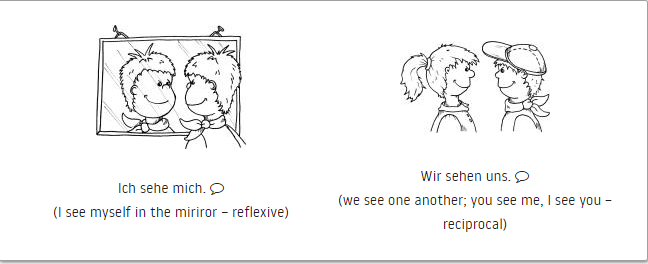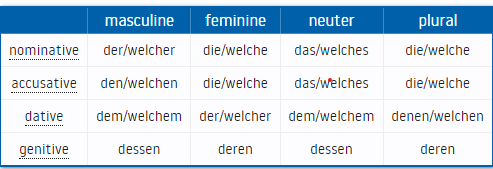Reflexive Pronouns in German Grammar
Reflexive Pronouns in Accusative and Dative

- Reflexive pronouns in German grammar are mich/mir, dich/dir, uns, euch and sich. We use them with reflexive and reciprocal verbs. Reflexive pronouns always refer to the subject and must be declined to match the case they are in.
Learn how and when to use reflexive pronouns with Learn German online. In the exercises, you can practise what you have learnt.
Table of Reflexive Pronouns in Accusative and Dative
Use the following table of reflexive pronouns in the accusative and dative cases to help you learn German reflexive pronouns.

Usage
We use reflexive pronouns with two different types of verbs in German grammar:
- Reflexive verbs use the reflexive pronouns with the meaning “oneself”. We use the reflexive pronoun in the dative if there is also an accusative object. (see also Reflexive Verbs)
- Example: Ich glaube, wir kennen uns. (= wir kennen einander)
- Tom und Albert streiten sich. (= der eine mit dem anderen)

Relative Pronouns in German Grammar
Relative pronouns introduce relative clauses. Learn about relative pronouns in German grammar and practise using them in the nominative, accusative, dative and genitive with Learn German Online site.
Table of Relative Pronouns in German Grammar
The table provides an overview of masculine, feminine, neuter and plural relative pronouns in all four German cases.

- Example: Die Polizei sucht den Mann, der die Bank überfallen hat.
- Das ist der Mann, dessen Hut weggeflogen ist.
- Wer ist der Mann, dem wir begegnet sind?
- Der Mann, den wir gegrüßt haben, ist mein Lehrer.
Possessive in German
Learn about Possessive’s in German Grammar.
|
|
|
||
|
my girlfriend’s cat
|
|||
|
my boyfriend’s dog
|
|||
|
my children’s toys
|
|||
|
|
|
|
|
|
This is my colleague’s overcoat.
|
|||
|
That is my colleague’s car.
|
|||
|
That is my colleagues’ work.
|
|||
|
|
|
|
|
|
The button from the shirt is gone.
|
|||
|
The garage key is gone.
|
|||
|
The boss’ computer is not working.
|
|||
|
|
|
|
|
|
Who are the girl’s parents?
|
|||
|
How do I get to her parents’ house?
|
|||
|
The house is at the end of the road.
|
|||
|
|
|
|
|
|
What is the name of the capital city of Switzerland?
|
|||
|
What is the title of the book?
|
|||
|
What are the names of the neighbour’s / neighbor’s (am.) children?
|
|||
|
|
|
|
|
|
When are the children’s holidays?
|
|||
|
What are the doctor’s consultation times?
|
|||
|
What time is the museum open?
|
|||
|
|
|
|
|
In addition you can Improve your German with Learning German App.





























